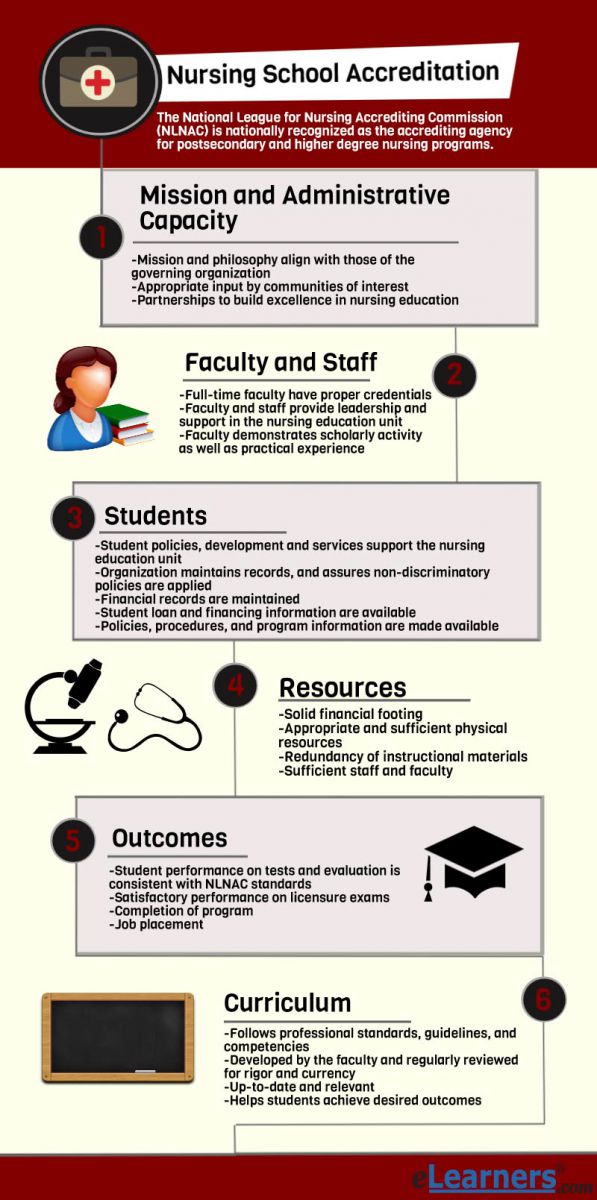Nursing Program Accreditation
By Susan Smith Nash, Ph.D.
It can be unclear to the consumer which type of nursing program accreditation really matters most, especially when the degrees involve professional programs or skills. In some cases, regional accreditation is actually less important than receiving accreditation from the agency designated by the U.S. Department of Education. In the case of nursing, programs must satisfy very strict guidelines, which assure employers of a high level of quality and prudent oversight.
Specifically, in the case of nursing, the National League for Nursing Accrediting Commission (NLNAC) is the agency nationally recognized by the U.S. Department of Education as the accrediting agency for postsecondary and higher degree nursing programs. NLNAC provides specialized nursing accreditation for all types of nursing education programs (clinical doctorate, master's, baccalaureate, associate, diploma, and practical).

NLNAC conducts reviews of nursing programs and organizes site visits and accreditation reviews. The guidelines are very specific, and any nursing program that desires accreditation must be sure to align themselves with the sets of standards that NLNAC publishes.
What have colleges and universities done to prepare themselves for an accreditation visit or review? What are the minimum standards that your program has satisfied?
Generally speaking, there are six separate sets of standards that NLNAC sets out. Below are overviews which describe how programs prepare themselves. In order to effectively address the issue of accreditation reviews, the college should prepare a thorough self study.
STANDARD 1- Mission and Administrative Capacity
Your nursing program must show that they have a mission that aligns well with the governing organization's core values, strategic goals, and objectives. For example, if the overall university's strategic object is to provide education to underserved communities, then the nursing program must demonstrate that it embraces the same values, and has taken steps to implement them. Administration must be headed by individuals with appropriate degrees and experience (graduate degrees in nursing), and the institution has taken steps to include strategic alliances, partnerships, and community affiliations. Key elements include the following:
- outcomes, mission, and philosophy align with those of the governing organization
- students, faculty, and administrators have representation
- appropriate input by communities of interest
- partnerships to build excellence in nursing education
- key personnel have graduate nursing degrees
- nurse administrators have sufficient time and resources to fulfill obligations and responsibilities of the role
- records kept of complaints and responses to them
- distance education effors must align with mission of the governing organization and nurse education unit
STANDARD 2- Faculty and Staff
The key in this standard is that the college makes sure that full-time faculty have the proper credentials. Qualified faculty and staff provide leadership and support necessary to attain the goals and outcomes of the nursing education unit. Laboratory personnel and mentors/tutors/preceptors hold appropriate credentials. Faculty must demonstrate scholarly activity as well as practical experience. In the case of distance education, the organization provides training and support for instruction and evaluation.
STANDARD 3- Students
Student policies, development, and services support the goals and outcomes of the nursing education unit. The organization maintains records, and assures that non-discriminatory policies are applied. Financial records are maintained; compliance with Title IV requirements is assured; student loan and financing information are available. Policies, procedures, and program information are made available, and any changes are communicated in a timely manner. Technology orientation and support are made available. Distance education support is provided.
STANDARD 4- Curriculum
The curriculum must be up-to-date and relevant, and it must help students achieve the desired outcomes. Safe practice and ethics are key elements.
- Follows professional standards, guidelines, and competencies, and includes student learning and program outcomes.
- Developed by the faculty and regularly reviewed for rigor and currency.
- Learning outcomes used as a basis of the curriculum, and they impact delivery, learning activities, and student progress.
- Cultural diversity incorporated.
- Effective evaluation methodologies.
- Students demonstrate established professional and practice competencies, and measure the achievement of student learning and program outcomes.
- Distance learning outcomes assessment includes more than one way to evaluate performance and competency.
STANDARD 5- Resources
The college must demonstrate that it is on sound financial footing, and that it has dedicated sufficient resources (financial, human resources, infrastructure, equipment, buildings), to be able to achieve goals and outcomes.
- Solid financial footing
- Appropriate and sufficient physical resoruces (labs, offices, computers, network)
- Back-up plan for equipment failure in the case of online/distance courses
- Redundancy of instructional materials
- Sufficient staff and faculty, with appropriate credentials
STANDARD 6- Outcomes
Upon successful completion of their course of study, students must be able to demonstrate they have achieved the target competencies, and also that their education has prepared them for success in a competitive workplace.
- Student performance on tests and evaluation is consistent with NLNAC standards
- Satisfactory performance on licensure exams
- Completion of program
- Job placement
- Courses prepare the student to function in a setting that requires problem-solving skills, analytical thinking, and general as well as specialized knowledge
- Distance education students have access to job placement services
